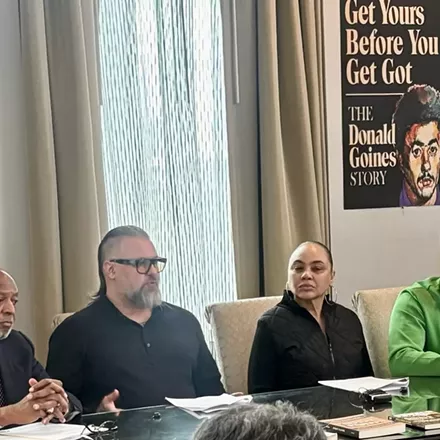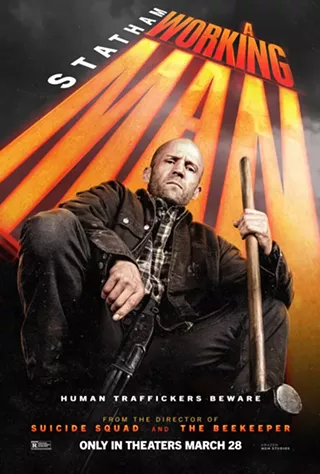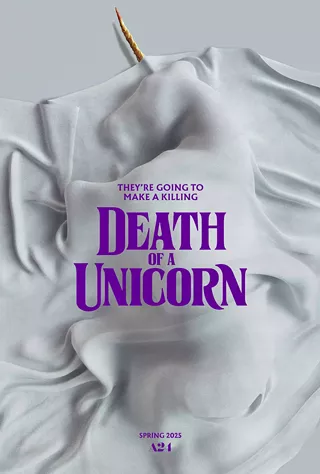Ghost Dog: The Way of the Samurai is kind of like that, only with gunplay. Or it's like watching a movie where nothing happens, only lots of stuff happens. Or it's like reading a series of haiku. While sitting in a hot tub. With a gun.
Actually, it's a little hard to describe.
One thing it's not, though, is boring. It's one of the most consistently entertaining films you're likely to see, yet there's almost no variation in mood.
The tone of the film matches the perfectly flat affect of the lead character, Ghost Dog (Forest Whitaker), an inner-city B-boy-cum-samurai, who raises pigeons, enjoys rap, jazz and reggae, and kills people.
Ghost Dog works for a minor mob boss, but takes his form of life from the Japanese classic The Way of the Samurai by Hagakure. His dedication to his master is as complete as that of the ancient Japanese retainers, who would sooner die than see any harm come to the one they served.
Unfortunately, his master Louie (John Tormey) doesn't quite share his code, and is asked by the upper level mob bosses to off his young protégé. This is, of course, easier said than done, as Ghost Dog is the perfect killing machine.
Since the mob bosses will kill Louie if Louie doesn't kill Ghost Dog, Ghost Dog starts killing all the other mob bosses in order to protect Louie and save his own life. While this forms the basis of a plot, the movie seems more like a disconnected series of perfectly formed little sequences.
Some of the best stuff involves Ghost Dog's relationship with his "best friend," Raymond, who runs an ice-cream stand and speaks only French. Ghost Dog speaks only English, so when he tells Raymond, "I have to go, I have businessä," Raymond says in French, "I guess he has to go. Must be business." This running gag never varies, but, like the rest of the film, is ceaselessly entertaining.
Ghost Dog's interactions with Louie are equally bizarre. In spite of the fact that they speak the same language, their basic codes of life are so different that they might as well be trying to communicate in semaphore and Serbo-Croatian.
Which is part of what makes Ghost Dog work so well -- its characters, while drawn from stereotypes, are weirded up just enough to make them strangely compelling, though never overpowering. The mob bosses are some of the best examples of this. They spend all day watching violent cartoons on television. Like many movie Mafiosi, they are headquartered in a restaurant, only it's an abandoned Chinese restaurant. They have arguments about the names of rap stars. Or start riffing on the chiefs of American Indian tribes. In short, something is just wrong.
The wrongness is subtle but omnipresent. When Ghost Dog steals a car, the license plate is not that of any particular state, but bears the slogan "The Industrial State." He steals another, and its plate reads "The Highway State." An ugly Mafioso is unironically called "Handsome Frank" by his associates. A little girl carries the books Wind in the Willows, Frankenstein, The Souls of Black Folks, and the seemingly pornographic Night Nurse.
In the hands of a lesser filmmaker all of this could seem like gimmickry, but the reason it works is that it sets a consistent tone to the film. Director Jim Jarmusch uses all of these oddities, combining disparate elements from our familiar world to create a fantasy realm every bit as cohesive as that of J.R.R. Tolkein's Lord of the Rings, only so much less geeky.
It's a trip to another realm, where everything has exactly the same value as everything else, but the fact that it's all so slightly unlike the real world makes every moment surprising and quietly compelling.
The mood of the film is best summed up by the scene where Raymond takes Ghost Dog to the top of a building to show him something. Raymond tells Ghost Dog (who doesn't understand a word Raymond says) that the other day he went to a rooftop and saw something amazing. When they get there, they look upon a neighboring rooftop to see a man assiduously building an enormous boat. Raymond shouts to the man, in French, "How are you going to get that thing off the roof?"
The man replies, in Spanish, "I don't understand you. I have to get back to work."
Ghost Dog: The Way of the Samurai opens Friday at Century Gateway theater (792-9000).












